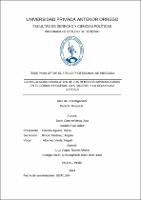| dc.contributor.advisor | Cruz Vegas, Ruben Alfredo | |
| dc.contributor.author | Coronel Meca, Ana | |
| dc.creator | Coronel Meca, Ana | |
| dc.date.accessioned | 2024-05-06T20:24:51Z | |
| dc.date.available | 2024-05-06T20:24:51Z | |
| dc.date.issued | 2024 | |
| dc.identifier.uri | https://hdl.handle.net/20.500.12759/28231 | |
| dc.description.abstract | La presente investigación, se ha iniciado con la siguiente pregunta de
investigación: ¿De qué manera resulta imposible identificar los demás
remedios impugnatorios, aparte de la oposición, señalada en el artículo 356
del Código Procesal Civil vigente?
De esa manera, se planteó como objetivo general: Demostrar de qué manera
resulta imposible identificar los demás remedios impugnatorios, aparte de la
oposición, señalada en el artículo 356 del Código Procesal Civil vigente.
Ahora, para alcanzar ese objetivo general, se plantearon los objetivos
específicos los siguientes: 1. Analizar el derecho impugnatorio y su regulación
legal en el Código Procesal Civil peruano vigente: 2. Analizar la regulación
legal y utilidad práctica de los remedios impugnatorios en el código procesal
civil vigente; y, 3. Proponer la derogación de los remedios impugnatorios en
el código procesal civil vigente.
Finalmente, después de haber utilizado los métodos de investigación
pertinentes, se ha podido arribar a la siguiente conclusión general: Se ha
logrado determinar que el Código Procesal Civil peruano no realiza una
prescripción adecuada y clarificada de los denominados remedios
impugnatorios; pues, si bien el artículo 356, realiza una mención de esta
categoría procesal, en los demás artículos del título referido a los medios
impugnatorios no existe ninguna mención a estos, lo que evidencia una
ausencia absoluta de su regulación en el ordenamiento procesal civil, lo que
sin duda hace que tanto jueces como abogados y demás operadores jurídicos
terminen por no comprender la verdadera naturaleza y alcances de esta
institución procesal | es_PE |
| dc.description.abstract | This investigation has begun with the following research question: How is it
impossible to identify the other challenging remedies, apart from the
opposition, indicated in article 356 of the current Code of Civil Procedure?
In this way, the general objective was proposed: To demonstrate how it is
impossible to identify the other challenging remedies, apart from the
opposition, indicated in article 356 of the current Code of Civil Procedure.
Now, to achieve this general objective, the following specific objectives were
proposed: 1. Analyze the challenge law and its legal regulation in the current
Peruvian Civil Procedure Code: 2. Analyze the legal regulation and practical
usefulness of the challenge remedies in the code current civil procedure; and,
3. Propose the repeal of the challenging remedies in the current civil
procedural code.
Finally, after having used the pertinent research methods, it has been possible
to reach the following general conclusion: It has been determined that the
Peruvian Civil Procedure Code does not provide an adequate and clarified
prescription of the so-called challenge remedies; Therefore, although article
356 makes a mention of this procedural category, in the other articles of the
title referring to the challenging means there is no mention of them, which
shows an absolute absence of its regulation in the civil procedural system,
which which undoubtedly causes judges, lawyers and other legal operators to
end up not understanding the true nature and scope of this procedural
institution | es_PE |
| dc.description.uri | Tesis | es_PE |
| dc.format | application/pdf | es_PE |
| dc.language.iso | spa | es_PE |
| dc.publisher | Universidad Privada Antenor Orrego | es_PE |
| dc.relation.ispartofseries | T_DEREP_051 | |
| dc.rights | info:eu-repo/semantics/openAccess | es_PE |
| dc.rights.uri | https://creativecommons.org/licenses/by/4.0/ | es_PE |
| dc.source | Universidad Privada Antenor Orrego | es_PE |
| dc.source | Repositorio Institucional - UPAO | es_PE |
| dc.subject | Remedios | es_PE |
| dc.subject | Medios Impugnatorios | es_PE |
| dc.title | La regulación legislativa de los remedios impugnatorios en el codigo procesal civil vigente y la seguridad jurídica | es_PE |
| dc.type | info:eu-repo/semantics/bachelorThesis | es_PE |
| thesis.degree.level | Título Profesional | es_PE |
| thesis.degree.grantor | Universidad Privada Antenor Orrego. Facultad de Derecho y Ciencias Politicas | es_PE |
| thesis.degree.name | Abogada | es_PE |
| thesis.degree.discipline | Derecho | es_PE |
| dc.subject.ocde | https://purl.org/pe-repo/ocde/ford#5.05.00 | es_PE |
| renati.advisor.orcid | https://orcid.org/0000-0002-8697-4468 | es_PE |
| renati.author.dni | 71486534 | |
| renati.advisor.dni | 04266438 | |
| renati.type | https://purl.org/pe-repo/renati/type#tesis | es_PE |
| renati.level | https://purl.org/pe-repo/renati/level#tituloProfesional | es_PE |
| renati.discipline | 421016 | es_PE |
| renati.juror | Ortecho Aguirre, Rocío | |
| renati.juror | Rincón Martínez, Angela | |
| renati.juror | Albornoz Verde, Miguel | |
| dc.publisher.country | PE | es_PE |




